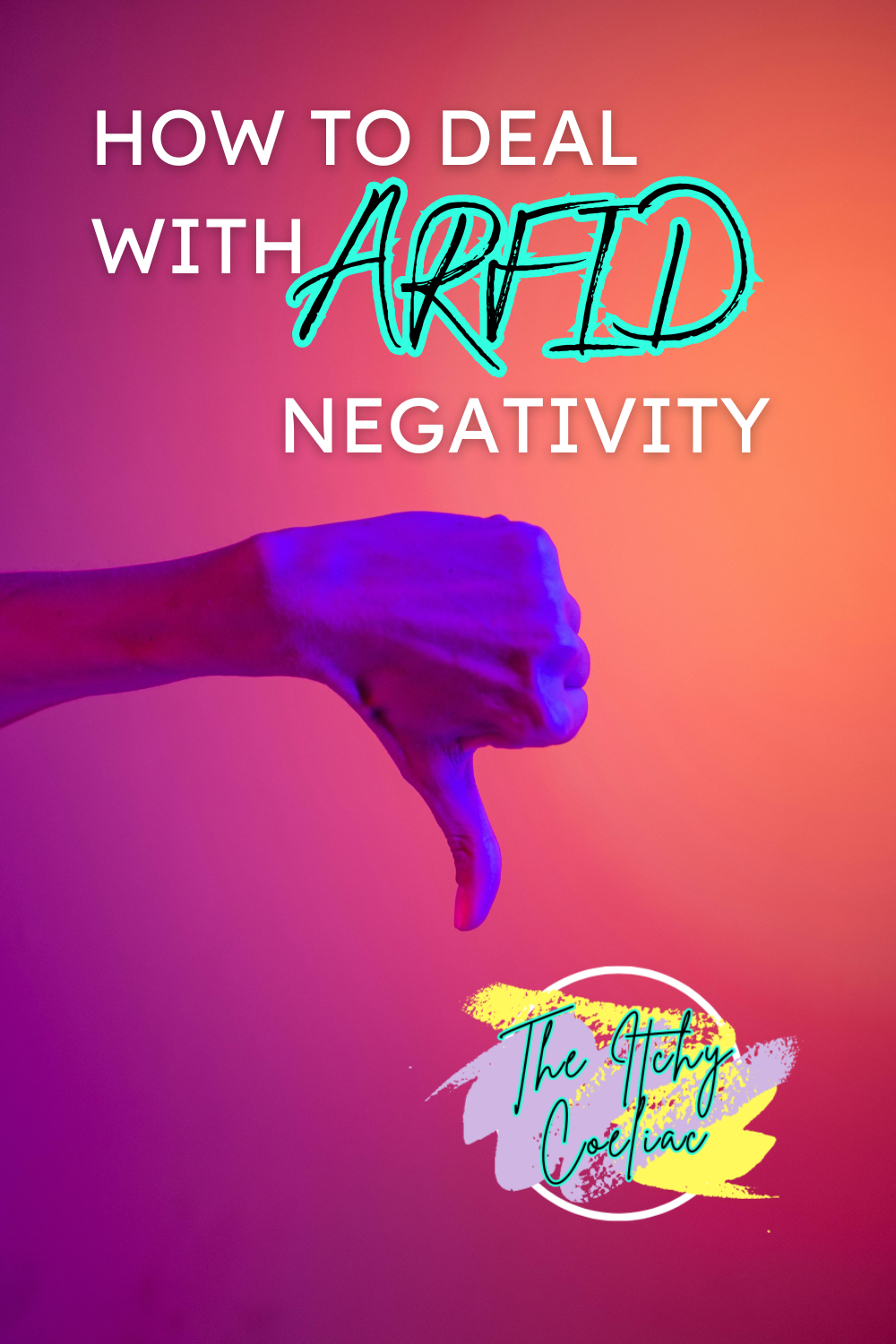No matter what you’re dealing with, there’s always those that like to bring their negativity to your door. This is especially true when it comes to Avoidant Restrictive Food Intake Disorder. There is a lot of conversation as to whether ARFID is a real thing or if it’s simply an excuse for ‘picky eating’.
In this post I want to highlight why it’s so important that ARFID is fully recognised as an eating disorder. Plus, I want to give you a few tips on how to deal with the naysayers!
Why not pin it for later?

Why is it so hard for some people to understand?
Even though I myself struggle with ARFID and understand its challenges, I can see why some people fail to quite get it.
Lack of awareness
Avoidant Restrictive Food Intake Disorder was only recognised and added to the DSM in 2013. Since then, there has been very little research into it. Because of this, there’s a huge lack of awareness of the disorder. As ARFID hasn’t been in the medical and public eye for very long it’s often misunderstood. When compared to eating disorders like anorexia or bulimia nervosa, it’s very much unknown.
The thing is, if people don’t know about it then how are they going to understand it? Unless they choose to do their own independent research, it’s unlikely they will.
This lack of awareness can also lead to a misdiagnosis of ARFID in many people struggling. People often see the symptoms of it as ‘picky eating’ and put it down to behavioural issues. When the symptoms are put down to simple issues with behaviour or personality quirks it can mean that those struggling are not getting the medical attention that they need. This leads to underreporting of ARFID cases, and so even less awareness!
ARFID is something that has also been given less public education. Say ARFID to someone on the street? They’re more than likely going to say ‘what the heck are you talking about?’.
I’ve struggled with this eating disorder for pretty much my entire life, but it was only in the last year that I even found out about ARFID! Finding out that there was a name and an actual recognised diagnosis for the way I acted and felt towards food – it was amazing.
Efforts to raise awareness and form treatment strategies are still developing but that’s why I’m writing this. To help raise that awareness and bring ARFID into the conversation!
If you’re looking for more information on ARFID, make sure to check out my post ‘What is ARFID? Everything You Need to Know’ for all the facts!

They’re just a picky eater!
Probably one of the biggest misconceptions that surround ARFID is that we are simply picky about the foods we eat. It’s often thought that ARFID as an eating disorder doesn’t exist. People claim it’s just a way for the ‘snowflake’ generation to blame their issues on imaginary medical conditions.
I have to say this makes me so angry whenever I see this point being put across. Mainly because it shows such a huge lack of understanding. It also because it completely writes off the experience those struggling with ARFID are going through.
You wouldn’t tell someone with a broken leg to just get up and walk? So why would you tell someone with an eating disorder to just eat? Yes, they are two completely different ailments but the point is that an illness is an illness, whether it’s apparent or not.
The frustrating thing is, many people that struggle with ARFID do wish that they could ‘just eat it’. We’d love to be able to head out to any restaurant, pick anything off the menu and just enjoy a nice meal.
We would love to just grab whatever and eat it but we’re literally held back by our bodies and our minds. If we were simply picky eating, we would not choose to starve over eating unfamiliar food.
Why not give this post a read ‘Safe Foods When You Have ARFID: Junk or a Lifeline’? It explains why our safe foods are so important and addresses some of the criticism we get for what we eat.
This also applies to one particular negative comment I see a lot which is ‘if they lived in a third world country they wouldn’t be like this’.
Firstly, this is simply not true. There are plenty of people living in third world countries that are dealing with eating disorders. Many have ARFID but the reporting rate is much lower due to lack of medical knowledge and accessibility.
I can pretty much guarantee you that if you placed me in a country where my only option was to eat a food that my ARFID didn’t agree with? I would still not eat it, my body would just choose to starve to death instead.
It’s the parents fault!
Another comment I see a lot when it comes to ARFID is that it’s all the parents fault. They aren’t strict enough, they’re letting their child get away with whatever they want, they’re feeding them unhealthy foods because they can’t be bothered.
Once again, this is a comment that makes me so angry.
Being a parent to someone with ARFID is not an easy job. Now, I’m not a parent myself but I’ve seen what it did to my own parents, having to manage my eating disorder – especially not knowing much about it!
As a child, my parents were definitely strict with me about food. We didn’t understand at the time that what I had was an eating disorder. I was often told I had to eat everything on my plate or I’d get nothing else. I often got nothing else.
There was one memorable night where my dad refused to let me leave the table till I’d eaten my meal. I sat there all night till about 2am. That meal was put in the fridge and given to me again the next night and it happened all over again.
Being strict with your kids about the way they eat does not mean that they’re going to magically get rid of their eating disorder. In fact, it’s more likely to make it worse.

When it comes to ARFID, fed is always best. I’d probably consider you a worse parent if you sat and watched your kid starve just because you wanted them to eat a vegetable.
Someone that suffers with ARFID would be no different if they had parents that forced them to eat certain foods or if they had parents that only gave them their safe foods.
The most important thing a parent can do is make sure their child is happy and healthy (not necessarily by forcing fruit and veg on them!). It’s fine to encourage them to try new things and is a good way of trying to eliminate that fear around food, broadening their diet.
So if you’re one of those people that just loves to find the negatives in life, just remember – people with ARFID are not that way because of the way they were raised!
It’s also important to recognise that not everyone with ARFID has struggled with it from being a child. Many people develop ARFID when they get older.
Find out more about why adults with ARFID need to be acknowledged in my post ‘Why Adults With ARFID Need To Be Seen’.
So how can we educate the naysayers?
It’s important to remember when dealing with those people that ‘don’t believe in ARFID’ that we must approach them from a point of education. Not arguing.
No matter how angry their comments might make you, they’re usually saying those things because they don’t know enough about ARFID and the way it works. The best thing we can do is explain and teach them a thing or two. Who knows? You might even get them to see a different point of view!
Approach the conversation with empathy and patience – easier said than done, I know!
We need to effectively communicate with others so that not only can we increase the understanding towards ARFID but also to dispel the misconceptions about it.
I admit that I’m guilty of just smiling and nodding when someone has called me a ‘picky eater’. I’ve always just thought that it’s easier than having to actually explain it properly. I realise now that even though it might be a little hard, it’s more important for people to understand. And the more awareness we can create, the better!
So my first piece of advice would be to embrace your inner teacher and educate the heck out of them. Try to find a way to explain it that isn’t too complex but also doesn’t diminish the struggles of ARFID.

I’ve found that explaining how food makes me feel and the fear that comes with it is a good way to start. Explain in a way that you’re comfortable with and that will be simple for others to understand.
It’s always good to ask if they have any questions. Or if there’s something specific that they mention in their comment, make sure to address it. It can be useful to address any concerns they might have so that rather than looking at ARFID with scepticism, they start to look at it from a more understanding point of view.
Linked below are a couple of websites that I think are really good for someone that wants to know more about ARFID. They’re great to recommend to people to try and give them a better understanding.
ARFID Awareness UK – https://www.arfidawarenessuk.org/
I would also recommend checking out @myarfidlife on Youtube. Hannah is an 8 year old girl who is doing an amazing job of fighting her ARFID! I’m blown away by the amount of new foods she’s tried.
I would also check out Cassidy Arvidson. She’s on TikTok and Instagram as @arfidawareness. She brings so much attention to ARFID and gives great information on what it is and what it’s like to live with ARFID.
Don’t be afraid to discuss it
Like I said in that last point, for pretty much my entire life I’ve just accepted being the ‘weirdo that doesn’t eat’. I’ve always found it easier to just play it off and mention it as little as possible.
After finding out about ARFID and seeing how little people knew about it, it made me realise that it’s something that should be being discussed.
That was part of the reason I started this blog. I knew I had experiences that others might find useful and I wanted to provide information for those that wanted to know more.
It’s become a safe place to share my thoughts on what life can be like with an eating disorder like ARFID. I’ve been told from family members that have read it that it’s also been useful for them. They now have a much better idea of why I’ve always struggled with eating and they’re now a lot more understanding.
I’ve been surprised when at a family gathering and it’s been brought up – in a positive way!
That’s the kind of awareness and education we need to be promoting. Whether that’s through social media, word of mouth, or even a blog.
There are always going to be people that don’t agree with something or want to fight against it. You’re always going to find those people that are whining about us being ungrateful or telling us to get on with it and just eat.
The simple fact of it is, they just don’t understand. So it’s up to us to try and explain it for them. All we can do is put across our experiences and thoughts, provide answers to questions that they have and if after all that they still are complaining?
Well, that’s their problem.
As long as you’ve got people around you that do understand and are able to support you then that’s all that’s important. Having ARFID is not something any of us asked for, it’s just something we have to learn to live with. And eventually, work our way up to challenging and overcoming it.
This is something I’m trying to do through my video series ‘CC’s Coeliac Taste Tests!’.
If you haven’t already, go check it out. Me and my sister are taking to the kitchen to cook up a gluten free dish. We’re cooking meals from Becky Excell’s Quick and Easy Gluten Free cookbook and most of them are food that I typically wouldn’t even give a second look.
But I’m challenging my ARFID through food exposure and giving the meals a try. They’re not all going to be winners but I’m hoping I can remove some of that fear that surrounds trying new foods and I’m able to find some new Coeliac friendly meals!
Make sure to like, comment and subscribe!






